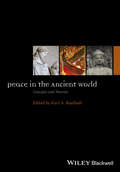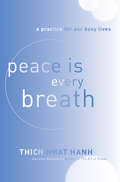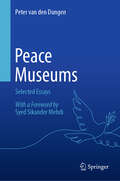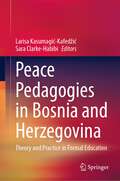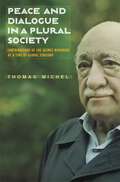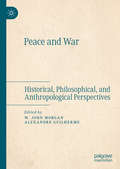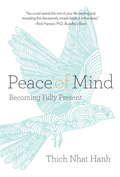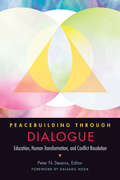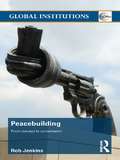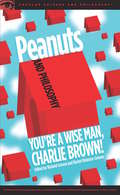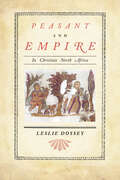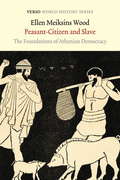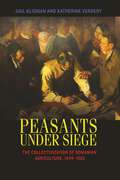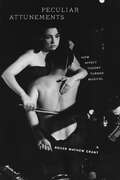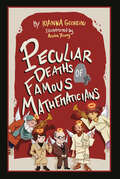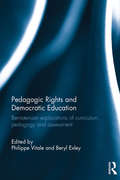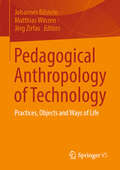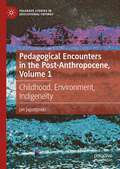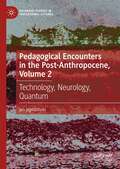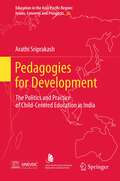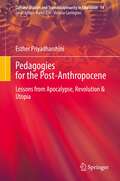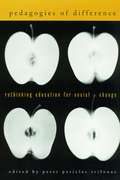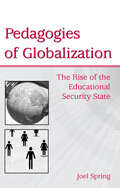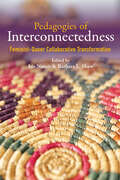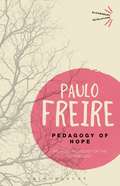- Table View
- List View
Peace In The Ancient World: Concepts And Theories
by Kurt A. RaaflaubPeace in the Ancient World: Concepts and Theories conducts a comparative investigation of why certain ancient societies produced explicit concepts and theories of peace and others did not. Explores the idea that concepts of peace in antiquity occurred only in periods that experienced exceptional rates of warfare Utilizes case studies of civilizations in China, India, Egypt, and Greece Complements the 2007 volume War and Peace in the Ancient World, drawing on ideas from that work and providing a more comprehensive examination
Peace Is Every Breath
by Thich Nhat HanhIn his travels around the country and the world, Zen master and international bestselling author Thich Nhat Hanh witnessed a growing unhappiness among the many people he encountered. He saw the hectic pace of our day-to-day lives taking a toll on our health and well-being. In response, the renowned teacher sat down to write Peace Is Every Breath, a book that makes the core teachings of Buddha accessible for everyone. In this jewel of a book, Thich Nhat Hanh does not suggest that we escape from reality and put our busy lives on hold. Far from it. Instead, he provides the insight and tools we need to incorporate the practice of mindfulness into our every waking moment. Thich Nhat Hanh shows us how we can transcend the mad rush of our days and discover within the here and now our own innate ability to experience inner peace and happiness. Offering personal anecdotes, meditations, and advice for mindfully connecting with our present experience, Thich Nhat Hanh guides us around potential pitfalls along the way. We do not need to escape reality to harness the joy and peace that is possible with every breath we take--the power of mindfulness can heal us from the suffering caused by the many stresses that surround us. Including original calligraphy by Thich Nhat Hanh, Peace Is Every Breath is a timely book filled with timeless wisdom and practical advice that is destined to become a classic.
Peace Museums: Selected Essays
by Peter van den DungenThis book is the first comprehensive study of the history, nature, and purposes of peace museums, comprising twenty-one essays by a leading authority in the field. It presents a powerful argument for the need for this new kind of museum that informs and inspires visitors that a world of peace and nonviolence is both necessary and possible. Whereas there are numerous museums about war and the armed forces, museums about peacemaking and peacemakers are rare; indeed, the very concept of peace museums is still largely unknown. This is a reflection of the traditional writing and teaching of history which is dominated by narratives of war and warriors, with little or no attention being paid to the history of efforts to prevent and abolish war. Peace museums are ideal instruments to bring the long, fascinating, and vitally important history of peace to life for a large public. Among the essays included are histories of two (forgotten and unknown yet) heroic efforts to prevent World War I, and then World War II, through museums that educated and alerted visitors about the disasters ahead if war was not avoided, and ways to steer a different course following the catastrophe that was the Great War. At a time when a barbaric war in Europe, continuing wars in Africa, and ominous threats of war in Asia, are raising the specter of nuclear war and World War III, the need for anti-nuclear bomb and anti-war museums is greater than ever. Such museums are essential for the development of a global culture of peace and nonviolence. The book provides inspiration and hope for everyone interested in efforts to overcome an existential threat to civilization that is wholly man-made.
Peace Pedagogies in Bosnia and Herzegovina: Theory and Practice in Formal Education
by Larisa Kasumagić-Kafedžić Sara Clarke-HabibiThis collection presents interdisciplinary perspectives on educating for peace in Bosnia and Herzegovina. It explores a range of theories, contexts, pedagogies and practices within formal education settings and draws attention to the multiple roles that teachers play in fostering socially transformative learning. The volume offers readers a critical exploration of peace pedagogy as an imagined ideal and fluid space between post-war educational politics, institutional and curricular constraints, and the lived experiences and identities of teachers and students in socially and historically situated communities. The book highlights local voices, initiatives and practices by illustrating good examples of how classrooms are being connected to communities, teacher education programs and teachers’ continued professional development. It demonstrates why and how the grammars of peace in Bosnia and Herzegovina are still in a state of flux and negotiation, and what the implications are for classroom practice and pedagogy. Recommendations are offered for policymakers, curriculum developers, teacher educators and teachers on how peace pedagogies can be promoted at all levels of the education system and through pre-service and in-service teacher education, taking into account the structural uniqueness of the country.
Peace and Dialogue in a Plural Society: Contributions of the Hizmet Movement at a time of Global Tensions
by Thomas MichelIn a world that is too often seen as a cloash of civilizations, some believe there is another way, a path that involves engagement, dialogue, and respect. In Thomas Michel's new book, Peace and Dialogue in a Plural Society, he explores how Fethullah Gulen is one of those speaking most vocally in favor of a world community, where different faiths and nations can come together at one table to solve the multitude of problems facing today's world. Exploring the spiritual roots of Gulen and the Hizmet Movement, as well as drawing parallels between his own work as a Catholic priest, Michel shows how Hizmet has helped build a blueprint for intercultural communication in a time when too many voices are trying to stoke the fires of discord. Through education, dialogue, and a respect for basic human dignity, Michel finds a foundation in Gulen's faith and Hizmet's service upon which a healthy, diverse society can be built.
Peace and War: Historical, Philosophical, and Anthropological Perspectives
by Alexandre Guilherme W. John MorganPeace and War: Historical, Philosophical, and Anthropological Perspectives is an accessible, higher-level critical discussion of philosophical commentaries on the nature of peace and war. It introduces and analyses various philosophies of peace and war, and their continuing theoretical and practical relevance for peace studies and conflict resolution. Using a combination of both historical and contemporary philosophical perspectives, the book is at once eclectic in its approach and broad in its inquiry of these enduring phenomena of human existence.
Peace of Mind
by Thich Nhat HanhWe can’t heal with our minds alone. Thinking can be something productive and creative, but without integrating body and mind, much of our thinking is useless and unproductive. In Peace of Mind, Zen master Thich Nhat Hanh reminds us that integrating body and mind is the only way to be fully alive in each moment, without getting lost in our thoughts while walking, cooking, driving, and going about our everyday lives. Only by cultivating a mindful body and an embodied mind can we be fully alive. Bringing together ancient wisdom and contemporary thinking, Thich Nhat Hanh says it's like hardware and software—if you don't have both, you can't do anything.Peace of Mind provides a foundation for beginning mindfulness practices and understanding the principles of mind/body awareness. By learning how our physical body and mind are inseparable in creating our own perceptions and experiences we can begin to trust and nourish our ability to create well-being.
Peacebuilding through Dialogue: Education, Human Transformation, and Conflict Resolution
by Peter N. StearnsThis volume examines the many dimensions of dialogue as a key driver of peaceful personal and social change. While most people agree on the value of dialogue, few delve into its meaning or consider its full range. The essays collected here consider dialogue in the context of teaching and learning, personal and interpersonal growth, and in conflict resolution and other situations of great change. Through these three themes, contributors from a wide variety of perspectives consider the different forms dialogue takes, the goals of the various forms, and which forms have been most successful or most challenging. With its expansive approach, the book makes an original contribution to peace studies, civic studies, education studies, organizational studies, conflict resolution studies, and dignity studies. Contributors: Susan H. Allen, George Mason University * Monisha Bajaj, University of San Francisco * Andrea Bartoli, Seton Hall University * Meenakshi Chhabra, Lesley University * Steven D. Cohen, Tufts University * Charles Gardner, Community of Sant’Egidio * Mark Farr, The Sustained Dialogue Institute * William Gaudelli, Teachers College, Columbia University * Jason Goulah, DePaul University * Donna Hicks, Harvard University * Bernice Lerner, Hebrew College * Ceasar L. McDowell, MIT * Gonzalo Obelleiro, DePaul University * Bradley Siegel, Teachers College, Columbia University * Olivier Urbain, Min-On Music Research Institute * Ion Vlad, University of San FranciscoDistributed for George Mason University Press and published in collaboration with the Ikeda Center for Peace, Learning, and Dialogue
Peacebuilding: From Concept to Commission (Global Institutions)
by Robert JenkinsThe emergence of The United Nations Peacebuilding Commission (PBC) in 2005 was the culmination of a long and contentious process. In this work Rob Jenkins provides a concise introduction that traces the origins and evolution of peacebuilding as a concept, the creation and functioning of the PBC as an institution, and the complicated relationship between these two processes. Jenkins discusses how continued contestation over what exactly peacebuilding is, and how its objectives can most effectively be achieved, influenced the institutional design and de facto functioning of the PBC, its structure, mandate and origins. He then moves on to examine the peacebuilding architecture in action and analyses the role that the PBC has carved out for itself, reflecting on the future prospects for the organization. The theory and practice of peacebuilding has assumed increasing importance over the last decade, and this work is essential reading for all students of conflict resolution, peace studies and international relations.
Peanuts and Philosophy
by Richard Greene Rachel Robison-GreeneIn Peanuts and Philosophy, twenty philosophers, from a diverse range of perspectives, look at different aspects of the Peanuts canon. How can the thoughts of children, who have yet to become grown-up, help us to become more grown up ourselves? Do we get good results from believing in something like the Great Pumpkin, even though we're disappointed every time? What can Linus's reactions to the leukemia of his friend Janice tell us about the stages of grief? Why don't we settle what's right and what's wrong by the simple method of asking Lucy? Is true happiness attainable without a warm puppy? Do some people's kites have a natural affinity for trees? Is Sally an anarchist, a nihilist, or just a contrarian? Does Linus's reliance on his blanket help him or hurt him? Is Charlie Brown's philosophy of life pathetic or inspirational?Other topics include: how the way children think carries general lessons about transcending our limitations; the Utopian quest as illustrated by Charlie's devotion to the Little Red-Haired Girl; Snoopy's Red Baron and history as selective memory; the Head Beagle as Big Brother. And, as we would expect, Lucy's repeated cruel removal of Charlie's football has several philosophical applications.
Peasant and Empire in Christian North Africa (Transformation of the Classical Heritage #47)
by Leslie DosseyThis remarkable history foregrounds the most marginal sector of the Roman population, the provincial peasantry, to paint a fascinating new picture of peasant society. Making use of detailed archaeological and textual evidence, Leslie Dossey examines the peasantry in relation to the upper classes in Christian North Africa, tracing that region's social and cultural history from the Punic times to the eve of the Islamic conquest. She demonstrates that during the period when Christianity was spreading to both city and countryside in North Africa, a convergence of economic interests narrowed the gap between the rustici and the urbani, creating a consumer revolution of sorts among the peasants. This book's postcolonial perspective points to the empowerment of the North African peasants and gives voice to lower social classes across the Roman world.
Peasant-Citizen and Slave
by Ellen Meiksins WoodThe controversial thesis at the center of this study is that, despite the importance of slavery in Athenian society, the most distinctive characteristic of Athenian democracy was the unprecedented prominence it gave to free labor. Wood argues that the emergence of the peasant as citizen, juridically and politically independent, accounts for much that is remarkable in Athenian political institutions and culture. From a survey of historical writings of the eighteenth and nineteenth centuries, the focus of which distorted later debates, Wood goes on to take issue with influential arguments, such as those of G.E.M. de Ste Croix, about the importance of slavery in agricultural production. The social, political and cultural influence of the peasant-citizen is explored in a way which questions some of the most cherished conventions of Marxist and non-Marxist historiography.
Peasants under Siege: The Collectivization of Romanian Agriculture, 1949-1962
by Katherine Verdery Gail KligmanIn 1949, Romania's fledgling communist regime unleashed a radical and brutal campaign to collectivize agriculture in this largely agrarian country, following the Soviet model. Peasants under Siege provides the first comprehensive look at the far-reaching social engineering process that ensued. Gail Kligman and Katherine Verdery examine how collectivization assaulted the very foundations of rural life, transforming village communities that were organized around kinship and status hierarchies into segments of large bureaucratic organizations, forged by the language of "class warfare" yet saturated with vindictive personal struggles. Collectivization not only overturned property relations, the authors argue, but was crucial in creating the Party-state that emerged, its mechanisms of rule, and the "new persons" that were its subjects. The book explores how ill-prepared cadres, themselves unconvinced of collectivization's promises, implemented technologies and pedagogies imported from the Soviet Union through actions that contributed to the excessive use of force, which Party leaders were often unable to control. In addition, the authors show how local responses to the Party's initiatives compelled the regime to modify its plans and negotiate outcomes. Drawing on archival documents, oral histories, and ethnographic data, Peasants under Siege sheds new light on collectivization in the Soviet era and on the complex tensions underlying and constraining political authority.
Peculiar Attunements: How Affect Theory Turned Musical
by Roger Mathew GrantPeculiar Attunements places the recent turn to affect into conversation with a parallel movement in European music theory of the eighteenth century. During that time the affects—or passions, as they were also called—formed a vital component of a mimetic model of the arts. Eighteenth-century critics held that artworks imitated or copied the natural world in order to produce copies of the affects in their beholders. But music caused a problem for such theories, since it wasn’t apparent that musical tones could imitate anything with any dependability, beyond the rare thunderclap or birdcall.Struggling to articulate how it was that music managed to move its auditors without imitation, certain theorists developed a new affect theory crafted especially for music, postulating that music’s physical materiality as sound vibrated the nerves of listeners and attuned them to the affects through sympathetic resonance. This was a theory of affective attunement that bypassed the entire structure of representation, offering a non-discursive, corporeal alternative. It is a pendant to contemporary theories of affect, and one from which they have much to learn. Inflecting our current intellectual moment through eighteenth-century music theory and aesthetics, this book offers a reassessment of affect theory’s common systems and processes. It offers a new way of thinking through affect dialectically, drawing attention to patterns and problems in affect theory that we have been given to repeating. Finally, taking a cue from eighteenth-century theory, it gives renewed attention to the objects that generate affects in subjects.
Peculiar Deaths of Famous Mathematicians
by Ioanna GeorgiouGetting and keeping teens interest in mathematics is vital to their future. But how, when there are so many dreary textbooks and repetitive curriculum requirements? Covering everything that they need to know is about all a school can do.What approach would work, when there are million other things for them to do?Ioanna Georgiou and Asuka Young have come up with a novel approach that is based on stories from history – with a twist! Peculiar Deaths combines short stories about key mathematicians from the past and how they died, with details of the mathematical advances that they made. But one of the deaths is made up – but which one?Can Beans Kill You? - Pythagoras Death by Square Root - Hippasus You should not be Disturbing my Circles! - ArchimedesWhat? A Woman Mathematician? Die! - HypatiaA bit of Gambling Killed No-one, Ever - Gerolamo Cardano A Very Rich Way to Die - Tycho Brahe Death by Time Calculation - Abraham De Moivre Just a Bit Too Young - Evariste Galois At the Mental Asylum - Andre Bloch Self-imposed Starvation and other Difficulties - Kurt Gö delFunny and enjoyable stories, with visual puzzles throughoutA great way to learn about mathematics of the past, and for students age 13 and over to enjoy learning and understand key concepts. Perfect for libraries, clubs and as prizes too.
Pedagogic Rights and Democratic Education: Bernsteinian explorations of curriculum, pedagogy and assessment
by Philippe Vitale Beryl ExleyThe basis of Bernstein’s sociology of education lays in is his theorisation of the different approaches to curriculum, pedagogy and assessment and the implications for pedagogic rights and social justice. This edited collection presents 15 empirical case studies and theoretical accounts from 22 international scholars who focus on the experiences of students and teachers in contexts marked by economic, social, cultural, linguistic and/or geographic diversity. Located in systems of education in Australia, France, Germany, Greece, Portugal, South Africa and the United States, each chapter contributes to a better understanding of the conditions of a democratic education across time and place.
Pedagogical Anthropology of Technology: Practices, Objects and Ways of Life
by Johannes Bilstein Jörg Zirfas Matthias WinzenThe volume examines the question of which specifically educational techniques are required in view of the increasing establishment and professionalization of pedagogical fields of work. In this context, an attempt is made to clarify what pedagogical and didactic preparation must take place for an increasingly technically oriented world. In addition, the everyday techniques of self-care are analyzed. And finally, pedagogical anthropology is also concerned with the question of who is the subject and object of technology.
Pedagogical Encounters in the Post-Anthropocene, Volume 1: Childhood, Environment, Indigeneity (Palgrave Studies in Educational Futures)
by jan jagodzinskiThis volume, the first of a two volume set, addresses three major areas in response to the post-Anthropocene: childhood, environment and indigeneity. Each of these areas is broadly addressed in relation to the concerns that have arisen both theoretically and educationally. The author terms these to be encounters as each area presents a particular problematic when addressing the phase change that the planet is undergoing where the anthropogenic labour of global humanity is contributing to climate change, endangering our very existence. There has been a concerted effort to overcome the nature-culture divide in education. The author reviews this development in the first section where there has been a particular emphasis placed on childhood education. In the second section he turns to the pedagogical theories that are attempting to overcome this same divide in environmental and science education. The last section attempts to bring into the conversation the vast literature on Indigeneity and their attempts to revise traditional education to meet these extraordinary times.
Pedagogical Encounters in the Post-Anthropocene, Volume 2: Technology, Neurology, Quantum (Palgrave Studies in Educational Futures)
by jan jagodzinskiAs a follow up to Pedagogical Encounters in the Post-Anthropocene, Volume I, this book addresses three major areas in response to the post-Anthropocene: Technology, Neurology, Quantum. Each of these areas is broadly addressed in relation to the concerns that have arisen both theoretically and educationally. As in Volume I, the author terms these to be encounters as each area presents a particular problematic when addressing the phase change that the planet is undergoing where the anthropogenic labour of global humanity is contributing to climate change, endangering our very existence. Technology in education has been a significant development. There is a concerted effort to review this development placing stress on the rise of learning machines and algorithms. In the second encounter the vast literature on neurology is addressed, especially neurodiversity and the various symptoms that have emerged in the post-Anthropocene era. The last section reviews issues related to quantum theory as this is fundamental to tensions between physics and metaphysics. The volume concludes with the author’s own pedagogical proposal for the future.
Pedagogies for Development
by Arathi SriprakashPedagogies for Development takes a sociological approach to examine the introduction of child-centred education in contemporary Indian policy and school contexts. It investigates the promise of democratic learning in development discourses to ask how far child-centred models can address poverty and social inequalities in rural Indian communities. Drawing on in-depth ethnographic research conducted in the south Indian state of Karnataka, the book offers a multi-level analysis of international, national and state education practices of pedagogic reform. The book contributes to pressing debates about how 'quality' education should be conceptualised and assessed in development contexts, and brings into focus the assumptions which associate schooling to social justice.
Pedagogies for the Post-Anthropocene: Lessons from Apocalypse, Revolution & Utopia (Cultural Studies and Transdisciplinarity in Education #14)
by Esther PriyadharshiniThis book draws on posthumanist critique and post qualitative approaches to research to examine the pedagogies offered by imaginaries of the future. Starting with the question of how education can be a process for imagining and desiring better futures that can shorten the Anthropocene, it speaks to concerns that are relevant to the fields of education, youth and futures studies. This book explores lessons from the imaginaries of apocalypse, revolution and utopia, drawing on research from youth(ful) perspectives in a context when the narrative of ‘youth despair’ about the future is becoming persistent. It investigates how the imaginary of 'Apocalypse' acts as a frame of intelligibility, a way of making sense of the monstrosities of the present and also instigates desires to act in different ways. Studying the School Climate Strikes of 2019 as 'Revolution' moves us away from the teleologies of capitalist consumption and endless growth to newer aesthetics. The strikes function as a public pedagogy that creates new publics that include life beyond the human. Finally, the book explores how the Utopias of Afrofuturist fiction provides us with a kind of 'investable' utopia because the starting point is in racial, economic and ecological injustice. If the Apocalypse teaches us to recognize what needs to go, and Revolution accepts that living with ‘less than’ is necessary, then this kind of Utopia shows us how becoming ‘more than’ human may be the future.
Pedagogies of Difference: Rethinking Education for Social Justice
by Peter Pericles TrifonasPeter Pericles Trifonas has assembled internationally acclaimed theorists and educational practitioners whose essays explore various constructions, representations, and uses of difference in educational contexts. These essays strive to bridge competing discourses of difference--for instance, feminist or anti-racist pedagogical models--to create a more inclusive education that adheres to principles of equity and social justice.
Pedagogies of Globalization: The Rise of the Educational Security State (Sociocultural, Political, and Historical Studies in Education)
by Joel SpringIn this ground-breaking book, Joel Spring examines globalization and its worldwide effects on education. A central thesis is that industrial-consumerism is the dominant paradigm in the integration of education and economic planning in modern economic security states.In the twenty-first century, national school systems have similar grades and promotion plans, instructional methods, curriculum organization, and linkages between secondary and higher education. Although there are local variations, the most striking feature is the sameness of educational systems. How did this happen? How was education globalized? Spring explains and analyzes this phenomenon and its consequences for human life and the future improvement of social and economic organizations. Central themes include:*the elements of the educational security state and the industrial-consumer paradigm in relationship to classical forms of education such as Confucianism, Islam, and Christianity, and their concerns with creating a just and ethical society;*the role of the 'other' in the globalization of educational structures as international military and economic rivalries spark competition between educational systems;*the transition from the Confucian village school to Western forms of education as exemplified in the lives of Ho Chi Minh and Mao Zedong;*the effect of the cultural and economic rivalry between the Soviet Union and the United States and its impact on schooling in both countries;*the rise of the educational security state in China, the Soviet Union, and the United States as these countries focus their educational efforts on military and economic development;*the evolution of progressive education as it appeared in revolutionary movements in South America, Cuba, Nicaragua, and El Salvador;*the transition from traditional to Westernized forms of Islamic education against the background of European imperialism, Arab nationalism and wars of liberation, and the uneasy tension between Western educational ideals and Islamic religious values;*socialist education in the Democratic People's Republic of Korea;*current developments in educational security states such as China, Japan, the United States, the new Russia, and the European Union; and*the consequences of English as the global language and the global spread of the industrial-consumer paradigm.Readership for this book includes scholars and students in comparative, international, and multicultural education; educational policy and politics; historical, social, and philosophical foundations of education; and curriculum studies. It is a particularly timely, informative, engaging text for courses in all of these areas.
Pedagogies of Interconnectedness: Feminist-Queer Collaborative Transformation (Transformations: Womanist studies)
by Richard Russo Ariella Rotramel Letizia Guglielmo Sharon R. Wesoky Christine Keating Jeremy Hall María Claudia André M. Gabriela Torres Isis Nusair Andrea N. Baldwin Sara Youngblood Gregory Barbara L. Shaw Kimberly Sanchez Misty De Berry Linh U. Hua K. Melchor Hall Rebecca Dawson Luisa Bieri Meryl Altman Danielle M. DeMuth Ayana K. Weekley Montserrat Pérez-Toribio Charlotte Meehan Emily Fairchild Leen Al-Fatafta Carolyn Beer Jordan Alderman Brayden Milam Andrea PutalaA generation of scholar-teacher-activists have moved beyond collaborating in theory to embodying, engaging in, and sharing how they practice their pedagogy. Isis Nusair and Barbara L. Shaw edit essays that link feminist, queer, anti-racist, decolonial, and disability theory and practice while using intersectional, transnational, and interdisciplinary approaches to explore how the personal remains political. The contributors describe ways of building communities within and beyond academic programs and examine what it means to engage in community-building work and action across institutional boundaries. In Part One, the essayists focus on the centrality of community building and reinterpreting bodies of knowledge with students, staff, faculty, and community members. Part Two looks at bringing transnational approaches to feminist collaborations in ways that challenge the classroom’s central place in knowledge production. Part Three explores organic collaborations in and beyond the classroom. A practical and much-needed resource, Pedagogies of Interconnectedness offers cutting-edge ideas for collaboration in pedagogy, education justice, community-based activities, and liberatory worldmaking. Contributors: Jordyn Alderman, Leen Al-Fatafta, Meryl Altman, María Claudia André, Andrea N. Baldwin, Carolyn Beer, Luisa Bieri, Rebecca Dawson, Misty De Berry, Danielle M. DeMuth, Emily Fairchild, Sara Youngblood Gregory, Letizia Guglielmo, Jeremy Hall, K. Melchor Hall, Linh U. Hua, Christine Keating, Charlotte Meehan, Brayden Milam, Isis Nusair, Montserrat Pérez-Toribio, Andrea Putala, Ariella Rotramel, Ann Russo, Kimberly Sanchez, Barbara L. Shaw, M. Gabriela Torres, Ayana K. Weekley, and Sharon R. Wesoky
Pedagogy Of Hope
by Paulo FreireWith the publication of Pedagogy of the Oppressed, Paulo Freire established himself as one of the most important and radical educational thinkers of his time. In Pedagogy of Hope, Freire revisits the themes of his masterpiece, the real world contexts that inspired them and their impact in that very world. Freire's abiding concern for social justice and education in the developing world remains as timely and as inspiring as ever, and is shaped by both his rigorous intellect and his boundless compassion. Pedagogy of Hope is a testimonial to the inner vitality of generations denied prosperity and to the often-silent, generous strength of millions throughout the world who refuse to let hope be extinguished.
